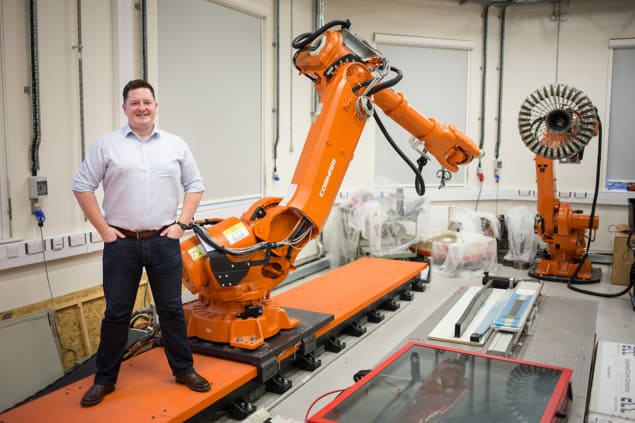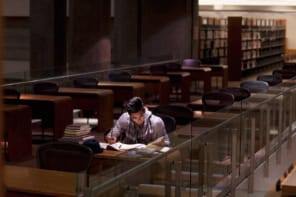Steve Bullock is an engineer, physics teacher, science communicator and education consultant. Currently the programme director of undergraduate aerospace engineering at the University of Bristol, UK, he talks to Tushna Commissariat about a career of bold choices, sideways jumps and obstacles overcome

How did you first become interested in science, physics and engineering?
I consider myself a formative engineer from an early age. One of my first memories is disassembling the bathroom scales and then breaking down in tears because I couldn’t get them together again. My dad helped me put it back together and that kicked off a childhood of making things, from model rockets and remote-control planes, to clocks and all sorts. I learnt a lot from my dad, who was a mechanic by trade. That led to an interest in the sciences at school. I found I had good skills in maths and physics, and I also joined the Air Cadets when I was a teenager.
Tell me a bit about your experience studying aerospace engineering at the University of Bristol, and how it compares to what you teach there today.
A lot of it is the same, but a lot has changed too. When I was a student, the engineering course at Bristol was, and still is, maths and theory heavy. But the bits that I really enjoyed were more practical, like the wing build. We’ve expanded on that a lot in recent years, but when I did it, it was just a structural activity.
The other thing that jumps out in my memory is the flight test course. Back in the day, we used an aircraft from another university where, I think, 12 of you at a time sat in these little seats with tiny windows and a little LCD screen in front of you. You’re writing down data while this aircraft is pitching and yawing about the sky. It had the highest utilization of sick bags of any flight that I’ve been on! Nowadays, we do some work on the ground in simulators because we can then give every student consistent experiences, not limited by downtime or the weather, then take students up in gliders, in collaboration with our student gliding society.
It was a good course and I enjoyed it, but I found there’s nothing like four or five years of a deeply scientific engineering degree to put you off it a little bit. So I pivoted at the end of my degree and went into teaching.
What specifically made you take a teaching training course after your degree, and become a physics teacher?
I’d always enjoyed working with young people. My family had fostered children for as long as I can remember. My mum was a wonderful woman who ended up fostering more than 100 kids, most of whom had great outcomes. I also liked doing youth work alongside my studies. I took a break from my studies at one point and ended up working at a children’s camp, chucking kids off abseiling towers and things like that. So I’d always thought about teaching. But I don’t think I would have taken on another year of studying and student loans to do the classical option of a PGCE, or another degree. I discovered this alternative teacher-training programme called Teach First, and the vocational approach really suited me. The other advantage of that route is that it sells itself as a two-year course that you can use either to launch yourself into a teaching career, or as a skills-development opportunity. I think going into general-science teaching as a physics specialist, and then going into physics teaching as an engineer, gave me a nice perspective on things.
Did you enjoy being a physics teacher?
Physics has always been a passion of mine. I think if I could go back, I might do my undergraduate degree in physics with astrophysics. There’s a real shortage of physics specialist teachers in UK schools. So being a physics teacher, one of the few, meant I had more teaching in my chosen specialism, and it was great. I was teaching all the A-level stuff (age 16–18) and leading on the curriculum-development side of things quite quickly too. There are a lot of opportunities for progression if you’re in that niche and I absolutely loved it.
I really enjoyed combining my love of science with my desire to make a difference. It wasn’t without its challenges – teaching can be an incredibly frustrating job, but also incredibly rewarding. The chief executive of Teach First at the time gave us a talk at the start of the course where he spoke about “hills of happiness and valleys of despair”. I think my summary of teaching is that the highs are higher, and the lows are lower, than any other career I’ve experienced, but it’s just such a satisfying job.
What made you decide to go back to university after a few years of teaching, to do your PhD in aerospace dynamics and control at Bristol?
I saw coming back to university as a selfish decision at the time. I was doing well at school and I could see myself carrying on in that direction, but I had kept in touch with my Master’s project supervisor. In 2010 he offered me a fully funded PhD, playing with giant robots and making them pretend to be aeroplanes. I couldn’t turn that down.
So that brought me back to academia and to Bristol. My intention was to do the PhD then go back to teaching, either in London or in the West Country. My PhD was funded for three and a half years. But quite rapidly, alongside my studies, I carved a niche for myself in supporting students from diverse entry routes. I took on the usual lab-demonstration stuff at the start of my PhD, but was also quickly given some sub-units to teach, and I tried some innovative stuff there. Then the opportunity came up to support students coming from non-traditional, non-A-level entry routes, whom historically universities have not been great at admitting or supporting.
I created time for everything by going part-time on my PhD and part-time on the teaching side of things. So actually it took me seven calendar years to finish my PhD. Although pro rata, it was three and a half years to the day – exactly as intended.
You are now a programme director of aerospace engineering at Bristol – how did that come about?
Once I finished my PhD, I became a full-time teaching fellow, and progressed at an accelerated rate through to senior lecturer today. Higher education has been going through a bit of a revolution as we’ve increased in student numbers and diversity. I think there’s more of an onus on making sure that we’re tailoring our support to students. I had the right skillset, and found myself in the right place at the right time. I am now the programme director of our aerospace engineering undergraduate programmes, which is a very interesting place to be in this modern world of blended learning.
It’s weird looking back. I think I was worried at times that jumping around so much would hold me back from progression on the traditional career route, in all of the areas of education that I’ve worked in, but actually it’s been a benefit. I’ve made a name for myself because of the varied skillset that I have. So they were all good decisions in hindsight.
What were the pitfalls, or stresses, of following this career random walk?
I think that any successful story can be phrased in a way that looks utterly sensible in hindsight, but I would be surprised if that was the reality at the time. Everyone has opportunities to direct what they want to do or push in a different direction. I’ve spent a lot of time stressing about optimizing all the different trajectories in both my personal life and my career. After a lot of soul-searching and a bit of coaching, I’ve come to the obvious realization that there are too many variables. You can’t treat life like a control problem in engineering, so you’ve got to treat it more as a social science.
You can’t treat life like a control problem in engineering
I still find myself wondering: am I at a local or a global optimum? What are the other Steves in “parallel universes” doing? That’s a whole other Physics World article, right? But I do think about all of the branches I could have taken and where I might have gone. I think feeling regret and loss for those doors that you’ve closed, or the branches that you allowed to wither, is folly and a path to disaster. That’s not to say that you shouldn’t take sideways jumps – I’ve done several of those. You’re not on rails, you’ve got the freedom to move whatever way you want to. But it’s best to appreciate the path you do take and look to the future.
What are some barriers and challenges you have faced in your career, if any?
I’ve definitely had a few challenges over the years. First, I didn’t quite get the grades I needed for my first-choice university. My options were to either go to my second choice, or defer for a year and go to my first. So I took a forced gap year because I really wanted to go to Bristol. This worked out well, as I had some great opportunities during that year, both working and then a little bit of travel.
Then during my undergrad studies, I was given a placement in parallel with my third year, with one of our close industrial partners on the programme. That should have been great, but the project was a defence-focused one. I found myself feeling increasingly uncomfortable with that. I like science for good but the thing that I was working on was uncomfortably close to the front-end of the defence industry. I really struggled to motivate myself with that, which eventually cascaded into my wider studies.
Combined with a couple of other challenges that I was facing at the time, I ended up with a diagnosis of depression, some medication and me suspending my studies during my third year. At the time, I wasn’t sure if I would return, but I kept the door open. I decided to go for a hard reset, changed my scenery completely and worked at a children’s holiday camp for a summer, which was just what I needed.
I came back refreshed, completed my third and fourth years, and went into teaching. It was a really difficult time, but after reaching my lowest point, I sought out the support that helped me get through it and then made some changes. I always try to encourage students and friends who are making tough decisions to think about the five-year test: in five years, is this going to be a major issue, or a minor blip? You don’t really know, but it’s often not as huge as it feels at the time, and sometimes that perspective can really help.
I still have crippling doubt at times and wonder what I’m doing, where it’s going and whether there’s a better way, but I now know the signs to look for. Again, to be a bit of an engineer, I call it preventative maintenance. You need to know when you need to pay attention to that strange noise going on in the engine and have a look at it, take it apart, investigate and fix it if you can; or when you can just live with it if you want to. Being proactive about mental health, general stress levels, particularly in the current times, I think is really, really important.
What’s your advice for students today?
As a student, take advantage of the academic and extracurricular opportunities that are offered, but be sensible and strategic about it. Also, while it’s important to do as well as you can in your core course, have other parts of your life to complement that. Find things that you’re passionate about – being interested makes you interesting. I personally follow that even today – I spend a lot of time on my core work, but a passion of mine is science communication. I’m a co-host of The Cosmic Shed podcast, which regular Physics World readers may be familiar with. I also love doing outreach and public engagement at festivals. I cycle and go on outdoor adventures.
Great opportunities do come up fortuitously, if you have networks of people whom you can trust and rely on, but also you can share opportunities with, and then make connections through – there’s give and take.



